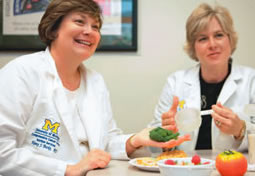You Ask We Answer
Cancer Center Dietitians Answer Your Questions
By Joan Daniels, R.D., and Nancy Burke, R.D.
University of Michigan Rogel Cancer Center Dietitians

Dear Joan and Nancy,
I'm confused about soy. I thought it might be beneficial in preventing cancer and heart disease. But I've also heard it can increase a woman's risk for breast cancer. I'm a breast cancer survivor; should I be eating soy or not?
-T.C., Sterling Heights, Mich.
Dear T.C.:
You have good reason to be confused. The simple answer is that the medical community still doesn't know enough about soy yet. Soy contains isoflavones, which have weak, estrogen-like effects. While some studies have shown that young, prepubescent girls may benefit from eating soy to prevent breast cancer later in life, eating soy may actually promote breast cancer risk in some older, post-menopausal women.
Some laboratory experiments used large amounts of soy isoflavones, from 5 to 16 times the amount commonly consumed by asian populations. Outside of the lab, soy's effect on cell growth may be difficult to repeat with amounts consumed from foods.
Eating one to two servings of soy foods daily is probably safe for most healthy women. Soy foods are low in saturated fat, and high in antioxidants and phytochemicals, or plant chemicals. Pure soy foods include tofu, tempeh, soy milk and edamame.
If you have been diagnosed with a hormone-dependent cancer, such as estrogen-receptor-positive breast cancer, limit your intake of pure soy foods in your diet. As a precaution, you should also limit your intake of soy food and avoid soy supplements in pill and powder form if you are taking hormone therapy for breast cancer.
If you have other types of cancer, soy probably won't hurt you, but there's also no evidence to suggest it will help you, either. This is true of soy's role in cardiovascular disease as well.
Dear Joan and Nancy,
I had been eating more peanut butter to help maintain my weight during cancer treatment, but after all the recalls this year, I started to get nervous. My immune system has enough to deal with, given my cancer diagnosis. What can I do to limit my risk of food-borne illnesses?
-M.P., Toledo, Ohio
Dear M.P.:
Thankfully, peanut butter is safe again. But unfortunately, when it comes to food recalls, there's not much you can do other than watch the news and check your cupboards for affected products. In the meantime, though, you can take steps to protect yourself by following commonsense food safety guidelines, particularly when you are undergoing cancer treatment. People who have neutropenia, or low white blood cell counts, can be especially at risk for food poisoning. Here's a brief review of good food safety habits:
 Be scrupulous about washing fruits and vegetables, particularly before eating them raw.
Be scrupulous about washing fruits and vegetables, particularly before eating them raw.
 Store raw meat and poultry separately and in plastic bags to prevent juices from leaking. Use different cutting boards for meat and poultry and wash them well to prevent cross-contamination.
Store raw meat and poultry separately and in plastic bags to prevent juices from leaking. Use different cutting boards for meat and poultry and wash them well to prevent cross-contamination.
 Always marinate and defrost meat in the refrigerator, not at room temperature.
Always marinate and defrost meat in the refrigerator, not at room temperature.
 Use meat thermometers to ensure meat is fully cooked. Avoid undercooked eggs and raw fish.
Use meat thermometers to ensure meat is fully cooked. Avoid undercooked eggs and raw fish.
 Stay away from unpasteurized dairy products and juices. Skip soft, moldy cheeses, like bleu cheeses.
Stay away from unpasteurized dairy products and juices. Skip soft, moldy cheeses, like bleu cheeses.
 It also may be a good idea to hold off on eating food from salad bars or deli counters.
It also may be a good idea to hold off on eating food from salad bars or deli counters.
 And most importantly, wash your hands for a minimum of 20 seconds-long enough to sing the alphabet-using plenty of soap and water. Be sure to get under fingernails, too. This simple step goes a long way in preventing all types of illnesses, including food-borne diseases.
And most importantly, wash your hands for a minimum of 20 seconds-long enough to sing the alphabet-using plenty of soap and water. Be sure to get under fingernails, too. This simple step goes a long way in preventing all types of illnesses, including food-borne diseases.
Continue reading the Summer, 2009 issue of Thrive.
